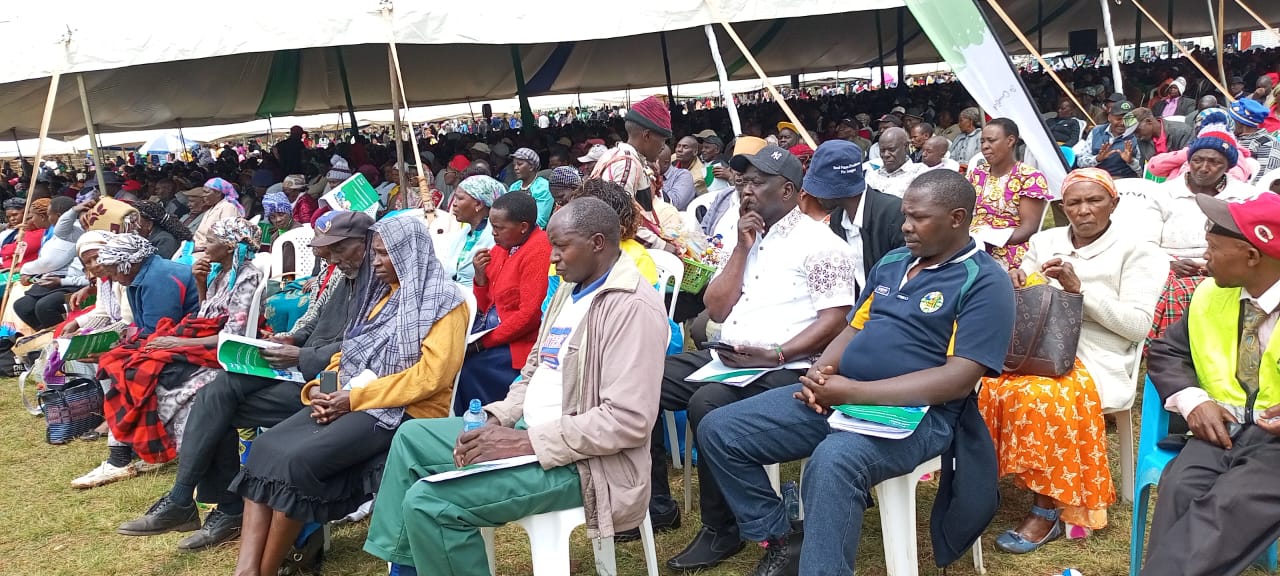 Githunguri Dairy Farmers Co-operative chairperson John Ndichu during an AGM held at Githunguri stadium on October 21, 2025
Githunguri Dairy Farmers Co-operative chairperson John Ndichu during an AGM held at Githunguri stadium on October 21, 2025 Farmers affiliated to Githunguri Dairy Farmers Co-operative during an AGM held at Guthunguri stadium in Kiambu county
Farmers affiliated to Githunguri Dairy Farmers Co-operative during an AGM held at Guthunguri stadium in Kiambu county
Dairy farmers from Kiambu county have raised concerns over the escalating cost of animal feed that continues to eat into their returns.
The farmers, affiliated to Githunguri Dairy Farmers Co-operative, the third-largest milk processing co-operative, said high feed costs have been weighing heavily on them, causing their cost of production to skyrocket.
During an annual general meeting held at Githunguri Stadium, the co-operative’s chairperson, John Ndichu, said scarcity of raw materials has fueled the high costs of feed.
This is because processors are forced to procure raw materials from neighbouring countries such as Tanzania and Uganda.
“Last year, the Tanzanian government banned the export of raw materials to Kenya, while Uganda imposed higher taxes. These two developments have led to an unprecedented rise in the cost of production,” Ndichu told the farmers.
The fluctuation in the value of the Kenyan shilling against the US dollar has further served to destabilise the sector.
But the farmers said milk prices in the market have remained static despite the many factors driving up the cost of production, putting an additional strain on their earnings.
They called on the government to intervene and reduce taxes imposed on animal feeds and farm inputs to ease the financial burden on producers.
“We have been suffering for a long time. It’s time for the government to come in and provide some much-needed relief by reducing some of the taxes driving up the cost of feed. That way, we will be able to produce more and support the economy,” farmer John Warui said.
Caroline Wangari said the high costs have opened a loophole for unscrupulous traders and processors to produce poor-quality feeds that are then bought by unsuspecting farmers.
She noted that consistently feeding livestock with substandard feeds resulted in reduced milk production that pushes farmers further into poverty, despite working hard.
The co-operative—that produces Fresha milk products—registered a sharp drop in milk production in the 2024/2025 financial year, with 91,069,554 kilogrammes of milk sold, a reduction from the 92,188,882 kilogrammes sold the previous year.
Consequently, the co-operative’s turnover dropped by Sh2.7 million to Sh10.59 billion.
However, the chairperson expressed optimism, saying the co-operative has recorded an upsurge of about 75,000 litres every month in the last three months.
He revealed that the co-operative has been facing challenges in marketing its products, especially in the international market.
He cited countries such as Saudi Arabia, Oman and Yemen that have been affected by regional conflicts but announced that new markets are being sought in the Congo and other African countries.
Currently, the cooperative has 3.95 million kilos of milk in storage as it continues to seek new markets.
Farmers earn an average of Sh49.47 per kg of milk, a slight increase from Sh49.30 paid last year.
The co-operative has, however, partnered with organisations such as the United Nations Industrial Development Organisation and the Swedish International Development Co-operation Agency to boost farmers’ capacity and promote sustainable agribusiness.
The partnership will support the construction of a farmer learning hall, the employment of extension officers and the provision of electric motorcycles, laptops and additional dairy cows to enhance the co-operative’s model farm.
“Our main goal as a society is to empower all farmers so they can become self-sustaining through agribusiness education,” Ndichu noted.
To cut operational costs, the co-operative has switched to firewood boilers and upgraded its milk packaging machines to improve efficiency.
It was recognised during the Ushirika Day celebrations and the Nairobi International Trade Fair for excelling in capacity building and locally manufactured products.












